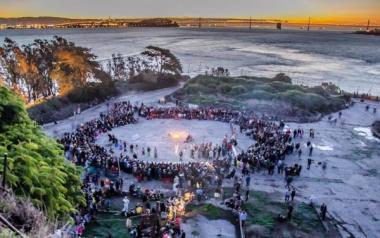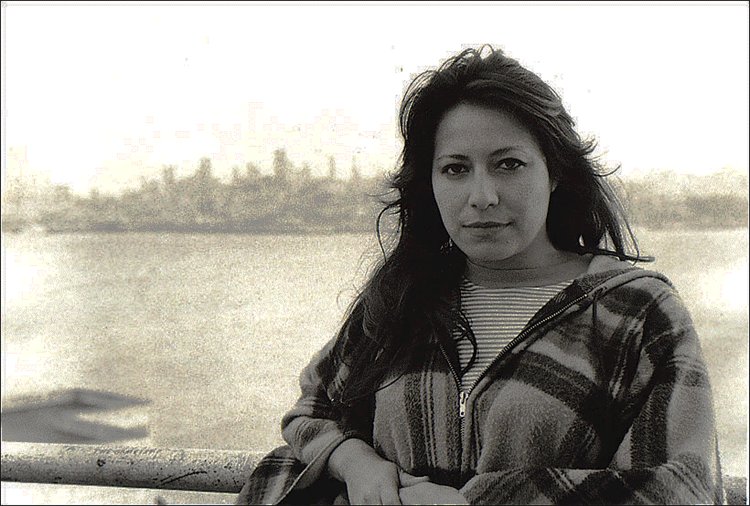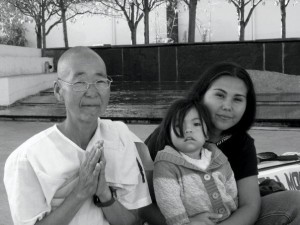
An Interview with Dr. LaNada War Jack (Shoshone), who helped lead the Occupation of Alcatraz in 1969, and Morning Star Gali (Pomo), an organizer of this year’s Indigenous People’s Sunrise Ceremony at Alcatraz. This was LaNada's first time back for Unthanksgiving on the island in 44 years, when she helped start the legendary Native American Occupation of Alcatraz in November of 1969.
Call it Unthanksgiving, Thanks-taking, Thanks-killing, Things-taken.
Tell us how the Native American Occupation of Alcatraz began.
LaNada War Jack: I just came off the reservation, was part of the acculturation process of young people from 18 to 35. When we got out here we were so happy to see other Indian people that we just started to gather and help each other.
We wanted to talk about what was going to change what was going on. I was the first Native American student to get into UC Berkeley.
What is a memory you have during the Occupation?
LaNada War Jack: We have to know as much as we can about our people because of the genocide of our people. It wasn’t until 1936, nine years before I was born, that the 1880 Civilization Regulations were lifted. During that time, our language, dances, spiritual ceremonies—our entire culture—was illegal in America.
I was thinking about how much of that has gone on. I am not thankful for the genocide that they still don’t acknowledge to this day. We make ceremony and we are always thankful all through the year. But the way that Thanksgiving is today is not the same thing. We are not thankful for everything that was imposed upon us.
When did you learn about patriarchy?
LaNada War Jack: I didn’t know about patriarchy until I just got off the res. I was surprised when I got here; I thought that everyone knew that we are in this ongoing war.
I used to get teased by guys who said, “Aren’t you supposed to be walking 10 feet behind us?” and I would just laugh at them because it was so ridiculous. When I began to learn about the patriarchal system, then I started to realize what the media was teaching.
I wasn’t raised that way on the res. I was always ready to speak when no one else was. I wasn’t pushing my way there. I was just there. I was with Native American Students United and we joined the Third World Strike. I was the only female leader with all the male components. I was the chair of our group so I was just part of this from the onset.
We were peaceful. The police state… they were the ones with bayonets and pepper spray. We were always non-violent with these violent forces ever since they [colonizers] came to this country.
What are your thoughts before you head to Alcatraz for the first time for Unthanksgiving in 44 years?
LaNada War Jack: I’m happy that the International Indian Treaty Council has continued these ceremonies year after year.
I was there in 1969. I helped plan the whole take over. We started this whole Day of Mourning together with Plymouth, Massachusetts. We must find inner strength to make our ancestors proud of us; it is because of all their sacrifice that we are alive today. It continues to this very day. We are still needing to stand up and resist. It still continues.

LaNada War Jack on Alcatraz in 1970 (Photo Credit: Bill Wingell)
Morning Star, what is the role you are playing with the Indigenous People’s Sunrise Ceremony?
Morning Star Gali: I’ve been participating in the ceremony since I was the age of my little one, since I was a baby. At the time, my parents were living in the AIM House School for Survival. The Indian Treaty Council, which hosts the Sunrise Ceremony, started as the international arm of the AIM. It started after many of our Native leaders had the door shut on them when they went to the UN. They had consultative status and became the first indigenous organization to have general consultative status. The UN Declaration on the Rights of Indigenous Peoples—this took 30 years.
I remember going as a child on the red and white fleet, it used to be a handful of people with a pipe ceremony and a sunrise ceremony. Today we welcome people of all backgrounds, of all nations and all faiths. We need to change this narrative of what Thanksgiving is and really this big lie that is perpetuated by American society. From 2008-2011, I worked as the Community Liaison Coordinator for the International Indian Treaty Council. The year after I moved back to my reservation and I continue to help organize the Sunrise Ceremony.
There is an Annual Shellmound Protest in Emeryville on Black Friday....What should folks know about this annual protest and the burial ground?
Morning Star Gali: It was the largest existing shell mound in the Bay Area. (A shell mound is a historic, cultural, and sacred site established by Ohlone Indians over centuries of use from 500 B.C. to approximately 1700 A.D.) There are still a number of Ohlone burials underneath the mall. We are asking people to refrain from shopping on the graves of Ohlone ancestors. No one would want a shopping mall put on the gravesites of their ancestors.

Morning Star Gali (right) at the first Shellmound Peace Walk in 2005 (Photo Credit: Sacred Sites Protection and Rights of Indigenous Tribes / Protect Glen Cove)
What are the issues facing Native women today that people should know about?
Morning Star Gali: There are a number of factors to be addressed. This year VAWA (Violence Against Women Act) was passed and it did not include provisions for Alaskan Native women. There is the fact that we have to keep pushing for this and that violence that happens to women on reservation. There are no prosecutions of non-native perpetrators. I was the Vice-Chair of the Tribal Health Clinic and there are no women services at all. There is not a midwife within a 100-mile range. We had to go 60 miles to receive reproductive health services. This is something we women are still fighting for.
We are on Day 4 of the 16 Days of Activism Against Gender Violence, and this year’s theme is Militarism. Help connect the dots between militarism, colonization, gendered violence and the myth of Thanksgiving for our readers.
Morning Star Gali: Unfortunately for native women, the connection is longstanding. This started with colonization where our societies were and still are matrilineal. Power was taken from our women through sexual abuse and our women societies were torn apart. People talk about wars in other countries but the war never ended here for our Native women. In the 1960s and 70s, the sterilization of Native women really came to life. There were brutal campaigns and whether it was while giving birth or a routine check-up, Native woman were sterilized without consent.
As a fellow mother and organizer, how must we raise our daughters?
Morning Star Gali: With as much educational alternatives that we can provide. We have to expose alternatives to what society is showing. It’s been a struggle because there is much healing that needs to take place from this inter-generational trauma, from this violence that we have to endure.
There is this expectancy that women are supposed to do it all and not complain about how on a daily basis we have to provide for our families and have to carry the household duties when we get home. We also work to raise our girls and our boys to have respect for themselves and for each other. It gets hard. There is a lot of harassment we receive as women. There is a lot we have to endure.
As women we carry that everyday and not complain so you don’t look weak. If you do or say something then you’re referred to in derogatory names. It’s about everyday keeping our heads above water.
Why is sisterhood crucial?
Morning Star Gali: My sister took my kids so I could run around and prepare for the Sunrise Ceremony, even during my nephew’s birthday. This is so I could get the wood and get the teepee. There are a lot of women who do this everyday to lead our movements and there is a lack of acknowledgement about the hardships we go through as women just to make this happen.
Although you may see a number of male speakers, it is primarily women who have organized this. It is a group of women who coordinate the sunrise gathering.
A version of this article was originally published on Af3irm.org.

